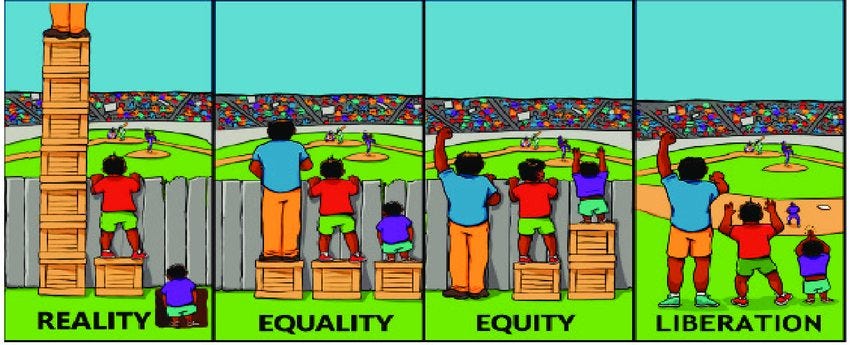
“But he’s spoiled!” my older son proclaimed loudly, expressing his opinion that his brother always gets what he wants.
Now, his claim is blatantly untrue. In fact, my older son is probably the one who gets what he wants more often just because he has stronger opinions. My younger son is more likely to say, “Yeah, sure, that sounds good.”
But I wasn’t going to get into that conversation. I knew it wasn’t going to go anywhere and just turn into the nonsense of trying to list every time that my older son got what he wanted.
Instead, I took a different angle. “Well, you know that we do try very hard to be fair. But fair doesn’t always mean equal.”
“Yeah, like the Fair Fairy,” he said. He was referencing a character in the Dog Man books who is basically a Judge Judy for the elementary set. Instead of making fair decisions, she just makes everyone miserable instead. When she gets fired from her job for being awful at it, she tries to get revenge and becomes the villain of the book.
“Exactly! Taking stuff away from both people doesn’t solve the problem and just makes everyone mad. So instead of being equal, we try to be equitable.” I explained how equity means that everyone gets the accommodations and resources they need instead of the same thing all of the time. As we’re a neurodiverse and neurodivergent family, the idea of varying accommodations makes sense to him already.
To bolster my point, I searched up one of those illustrations that show the difference between equity, equality, and justice. I actually found a page with several different illustrations.
For those not familiar, the most popular or perhaps famous of these illustrations shows three different versions of the same picture – three people standing outside of a baseball stadium, watching a game. The tallest person can easily see over the fence, the middle height person can barely see over the fence, and the shortest person can’t see at all.
Equality is giving everyone a box – even if it still doesn’t solve the shortest person’s problem and gives resources to the tallest person who doesn’t need it. Equity is giving everyone a box as they need it to see over the fence.
Other illustrations used variations on the book The Giving Tree, with two different people using different ladders to pluck apples off of a tree.
Looking at the Giving Tree illustration, my older son pointed out, “You could just plant another tree.” I grinned in surprise. I hadn’t even thought of that, but of course, he was right! Why not expand what’s available instead of competing for the same tree? On the other hand, we need to do both. We can’t just wait around for a whole tree to grow so people can get access. While the tree grows, we need to learn to share.
The whole conversation started as me trying to get my kid to stop saying his brother is spoiled. I could have (and often do) just told him to knock it off. But while I didn’t reduce his resentment, I think I at least got him to think about how we decide who gets what in both our household and the world.
Once I started the conversation, he took it one step further and got me thinking about something I hadn’t even considered! His thoughtfulness and willingness to engage with these questions turned the discussion into a much more complicated one about morality and how we solve these issues.
The thing is, kids can understand these big ideas. If we use language they understand while not talking down to them, they will engage with us on issues of fairness and morality. Sometimes they can actually do a better job than adults because don’t have as many of the built-in assumptions that we do as grown-ups.
So next time a kid says, “It’s not fair!” perhaps it’s an opportunity to reflect together on what fair even means in the first place.